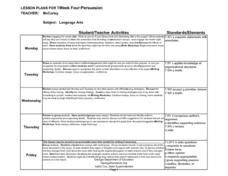Curated OER
Interpreting the Law on Safe Employment
Students watch a video and examine the United States government and the process of appeals.
Curated OER
Couch Potato or Inertia Victim?
Sixth graders how primary research is carried out. They design a simple survey questionnaire to interview people about their week average television watching time. They analyze the results and write a report based on the information.
Curated OER
Scavenger Hunt
Young scholars search for items in various parts of the newspaper noting the different types of information it provides.
Curated OER
When You Put It All Together!
Students review information from variety of news sources found on the Internet, and compare and contrast the information.
Curated OER
African-American Heroes
Students explore websites about famous African-Americans. They work in pairs to decide on an African American who should be honored with a stamp. They write a letter recommending this person for a stamp including appropriate reason why...
Curated OER
Oregon City: A Convergence of Endings
Students describe the activities that occurred in the Willamette Valley before the establishment of the Oregon Trail and agricultural settlement and explain the impact that American settlement had on the landscape and native groups who...
Curated OER
The Dialogues of Difference
Young scholars research the 1067 Newark riots and examine photographs of the riots for clues as to when they were taken and what was going on. They view different historical perspectives on the riots and then write dialogues based on the...
Curated OER
Extracting Meaning From What We See
Students recognize that all cultures have the same needs that they try to satisfy in ways that their predecessors found effective in their particular environments. Students discover how and why cultures change their customs.
Curated OER
Political Cartoons: Thinking Broadly, Communicating Succinctly
Students think broadly about the tsunami disaster and its aftermath through studying cartoons. Students critically think about the literary devices the authors/artists use, such as satire, metaphor and personification.
Curated OER
Alaska's Cultures: Regions & Native Peoples of Alaska
Students read the essay "Did American Aborigines have Culture?". They discuss culture and what is meant by culture.
Curated OER
Quotable Women for Peace
Students read various quotes by women regarding violence, war, and peace. They analyze and discuss the quotes and participate in various writing and role-play activities.
Curated OER
The Font of Funniness
Students research the work of a contemporary humorist by analyzing a variety of pieces of their work. They look at the work from a variety of media sources such as writing, videos, and broadcasts to decide how "American" the material is....
Curated OER
Language Arts: Persuasion
Students examine the characteristics of persuasive writing. They identify arguments, supporting details, and discuss how to reorganize and present information in more effective ways. Students compose their own essays and discuss their...
Curated OER
Geography: Islands and Alcatraz
Students, in groups, create maps of islands including map keys and compass roses. They compare and contrast their island communities with that of the island prison, Alcatraz. Students select from a series of projects, including writing...
Curated OER
Holes
Students watch the movie Holes. They list 5 key events from Holes and use a pyramid to rank the events in order of importance to the story. They determine cultural differences between the character and themselves.
















